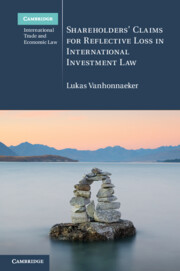Book contents
- Shareholders’ Claims for Reflective Loss in International Investment Law
- Cambridge International Trade and Economic Law
- Shareholders’ Claims for Reflective Loss in International Investment Law
- Copyright page
- Contents
- Figures
- Foreword
- Acknowledgments
- Table of Cases
- Table of Treaties
- Abbreviations and Acronyms
- Introduction: International Investment Law’s Narrative and Shareholders’ Claims for Reflective Loss
- 1 Shareholders in International Investment Law
- 2 International Investment Law’s Shareholders’ Claims for Reflective Loss: A Clash of Policies
- 3 Shareholders’ Claims for Reflective Loss in Domestic Regimes, Customary International Law of Diplomatic Protection, and Human Rights Law
- 4 International Investment Law on the Standing of Shareholders
- 5 Legal Uncertainty and Inconsistency Militating against Shareholders’ Claims for Reflective Loss: The Unpredictability of Investment Disputes Involving Shareholders
- 6 Shareholders’ Claims for Reflective Loss and the Dangers of Parallel Proceedings
- 7 International Res Judicata as a Solution to Parallel Proceedings Arising from Shareholders’ Claims for Reflective Loss in International Investment Law
- 8 The Consolidation of Proceedings and Mass Claims in International Investment Law and Arbitration
- 9 Calculating Damages in Shareholders’ Claims for Reflective Loss
- Conclusion
- Bibliography
- Index
5 - Legal Uncertainty and Inconsistency Militating against Shareholders’ Claims for Reflective Loss: The Unpredictability of Investment Disputes Involving Shareholders
Published online by Cambridge University Press: 13 July 2020
- Shareholders’ Claims for Reflective Loss in International Investment Law
- Cambridge International Trade and Economic Law
- Shareholders’ Claims for Reflective Loss in International Investment Law
- Copyright page
- Contents
- Figures
- Foreword
- Acknowledgments
- Table of Cases
- Table of Treaties
- Abbreviations and Acronyms
- Introduction: International Investment Law’s Narrative and Shareholders’ Claims for Reflective Loss
- 1 Shareholders in International Investment Law
- 2 International Investment Law’s Shareholders’ Claims for Reflective Loss: A Clash of Policies
- 3 Shareholders’ Claims for Reflective Loss in Domestic Regimes, Customary International Law of Diplomatic Protection, and Human Rights Law
- 4 International Investment Law on the Standing of Shareholders
- 5 Legal Uncertainty and Inconsistency Militating against Shareholders’ Claims for Reflective Loss: The Unpredictability of Investment Disputes Involving Shareholders
- 6 Shareholders’ Claims for Reflective Loss and the Dangers of Parallel Proceedings
- 7 International Res Judicata as a Solution to Parallel Proceedings Arising from Shareholders’ Claims for Reflective Loss in International Investment Law
- 8 The Consolidation of Proceedings and Mass Claims in International Investment Law and Arbitration
- 9 Calculating Damages in Shareholders’ Claims for Reflective Loss
- Conclusion
- Bibliography
- Index
Summary
This chapter focuses on the policy considerations weighing against shareholders’ claims for reflective loss, which are generally put forward in domestic corporate law regimes to justify the no-reflective loss principle. These policy considerations are analyzed in the context of international investment law and arbitration. In particular, this chapter successively critically assesses the potential floodgates of the courts and the disincentive to settle which shareholders’ claims for reflective loss can create, as well as treaty and forum shopping, which such claims can lead to. This chapter concludes that these concerns are sometimes exaggerated and not always justified in the context of international investment law, but, more importantly, that they can be cured.
Keywords
- Type
- Chapter
- Information
- Publisher: Cambridge University PressPrint publication year: 2020

